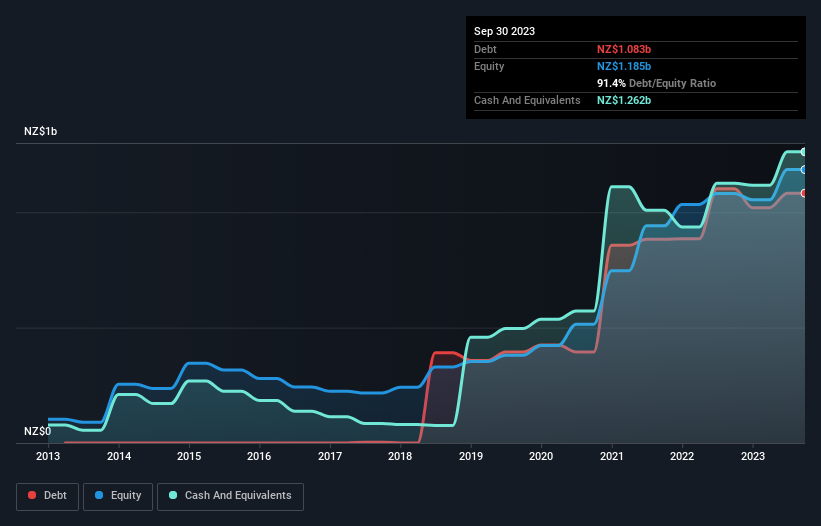
Legendary fund manager Li Lu (who Charlie Munger backed) once said, 'The biggest investment risk is not the volatility of prices, but whether you will suffer a permanent loss of capital.' When we think about how risky a company is, we always like to look at its use of debt, since debt overload can lead to ruin. We note that Xero Limited (ASX:XRO) does have debt on its balance sheet. But the real question is whether this debt is making the company risky.
Why Does Debt Bring Risk?
Debt assists a business until the business has trouble paying it off, either with new capital or with free cash flow. Ultimately, if the company can't fulfill its legal obligations to repay debt, shareholders could walk away with nothing. However, a more common (but still painful) scenario is that it has to raise new equity capital at a low price, thus permanently diluting shareholders. By replacing dilution, though, debt can be an extremely good tool for businesses that need capital to invest in growth at high rates of return. When we examine debt levels, we first consider both cash and debt levels, together.
See our latest analysis for Xero
What Is Xero's Debt?
As you can see below, Xero had NZ$1.08b of debt, at September 2023, which is about the same as the year before. You can click the chart for greater detail. But on the other hand it also has NZ$1.26b in cash, leading to a NZ$179.0m net cash position.

How Strong Is Xero's Balance Sheet?
According to the last reported balance sheet, Xero had liabilities of NZ$228.5m due within 12 months, and liabilities of NZ$1.24b due beyond 12 months. Offsetting these obligations, it had cash of NZ$1.26b as well as receivables valued at NZ$149.3m due within 12 months. So its liabilities outweigh the sum of its cash and (near-term) receivables by NZ$52.7m.
Having regard to Xero's size, it seems that its liquid assets are well balanced with its total liabilities. So it's very unlikely that the NZ$18.3b company is short on cash, but still worth keeping an eye on the balance sheet. Despite its noteworthy liabilities, Xero boasts net cash, so it's fair to say it does not have a heavy debt load!
Better yet, Xero grew its EBIT by 286% last year, which is an impressive improvement. That boost will make it even easier to pay down debt going forward. The balance sheet is clearly the area to focus on when you are analysing debt. But ultimately the future profitability of the business will decide if Xero can strengthen its balance sheet over time. So if you want to see what the professionals think, you might find this free report on analyst profit forecasts to be interesting.
Finally, while the tax-man may adore accounting profits, lenders only accept cold hard cash. Xero may have net cash on the balance sheet, but it is still interesting to look at how well the business converts its earnings before interest and tax (EBIT) to free cash flow, because that will influence both its need for, and its capacity to manage debt. Happily for any shareholders, Xero actually produced more free cash flow than EBIT over the last three years. That sort of strong cash conversion gets us as excited as the crowd when the beat drops at a Daft Punk concert.
Summing Up
We could understand if investors are concerned about Xero's liabilities, but we can be reassured by the fact it has has net cash of NZ$179.0m. And it impressed us with free cash flow of NZ$194m, being 104% of its EBIT. So we don't think Xero's use of debt is risky. Even though Xero lost money on the bottom line, its positive EBIT suggests the business itself has potential. So you might want to check out how earnings have been trending over the last few years.
If you're interested in investing in businesses that can grow profits without the burden of debt, then check out this free list of growing businesses that have net cash on the balance sheet.
New: AI Stock Screener & Alerts
Our new AI Stock Screener scans the market every day to uncover opportunities.
• Dividend Powerhouses (3%+ Yield)
• Undervalued Small Caps with Insider Buying
• High growth Tech and AI Companies
Or build your own from over 50 metrics.
Have feedback on this article? Concerned about the content? Get in touch with us directly. Alternatively, email editorial-team (at) simplywallst.com.
This article by Simply Wall St is general in nature. We provide commentary based on historical data and analyst forecasts only using an unbiased methodology and our articles are not intended to be financial advice. It does not constitute a recommendation to buy or sell any stock, and does not take account of your objectives, or your financial situation. We aim to bring you long-term focused analysis driven by fundamental data. Note that our analysis may not factor in the latest price-sensitive company announcements or qualitative material. Simply Wall St has no position in any stocks mentioned.
About ASX:XRO
Xero
A software as a service company, provides online business solutions for small businesses and their advisors in Australia, New Zealand, and internationally.
Flawless balance sheet with reasonable growth potential.

